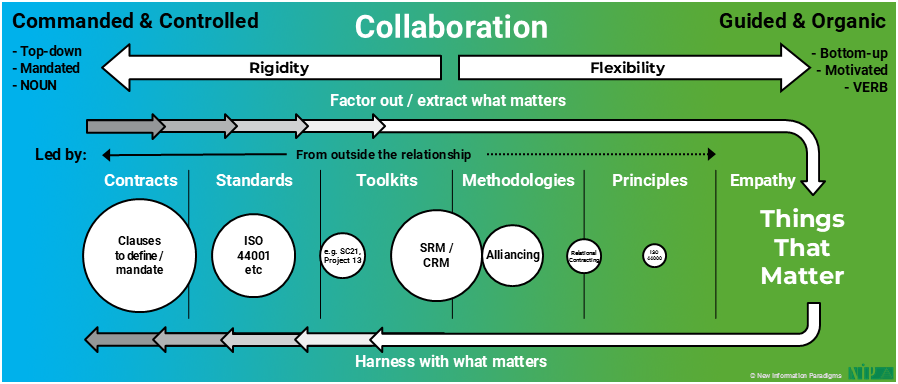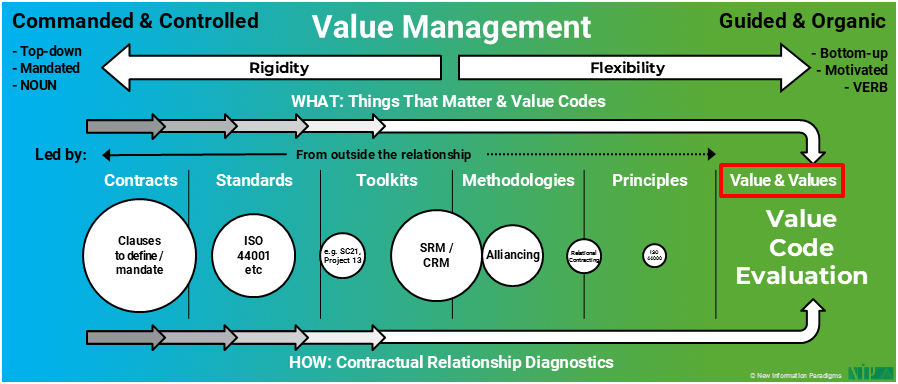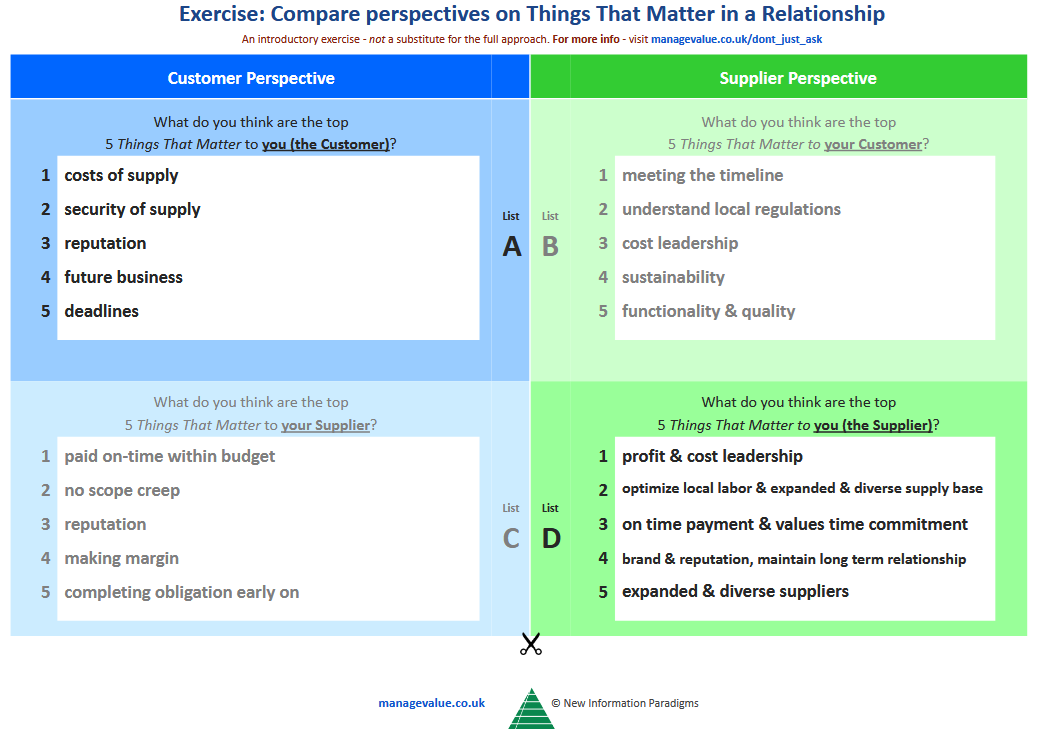Collaborative Working
Collaborative Working is simultaneously one of the most insightful and frustrating domains out there.
On the one hand, all proponents absolutely recognise that Complexity requires high-value connections and interactions between participants in an Ecosystem.
They know that increased specialisation necessitates Collaborative Working, that the right partnerships at the right Lifecycle stage can transform results, that risk and reward can be shared to everyone’s benefit and that the total is often greater than the sum of its parts.
On the other hand, most proponents treat Collaborative Working as something to do, train in or implement – sometimes even as the end goal in and of itself – and often assume that Value will inevitably and necessarily follow.
Most common is training in “collaborative behaviours”; in the worst cases, people are “ordered” to “work collaboratively”, whether in contracts or by management decree.
What is missing is an understanding that Collaborative Working is an emergent property – a Complex phenomenon – and only truly happens when people are engaged and motivated to self-organize around the Things That Matter and deliver change.
This all hinges on empathy:

Everything else is a facsimile of Collaborative Working, and whilst standards such as ISO 44001 make a valuable contribution in introducing the concept, raising the profile, and suggesting best practice, there is no other “formula” for success than:
- Establishing the Things That Matter to potential or actual customers.
- Identifying where potential partners align with those Things That Matter.
- Engaging at scale to prioritise areas of alignment and mutual interest.
- Revealing and involving those that show passion, responsibility and ability in those areas.
This is what creates the conditions in which Collaborative Working organically emerges; without these conditions, no amount of “behavioural training” will have any lasting effect, and behaviours will default back to where they were.
And that is the contribution that Value Management makes, realising the potential of Collaborative Working that we’ve recognised throughout, as demonstrated by e.g.:
- Being involved with the evolution of ISO 44001 since before it was even BS 11000.
- Encapsulating the ICW’s Toolbox within our ARC Diagnostic framework.
- Working with ASAP to develop its PCAP tool.

Featured content:
- Empathy: the Missing Piece of the Collaboration Puzzle
- Our series on how the Things That Matter process operationalizes empathy – the missing foundation of collaboration
- How the will to collaborate is there, and how the way hasn’t been (until now)
- Misalignment on Things That Matter: Proving the Point
- How the Three Steps to Value achieve Purposeful Collaboration
Articles related to Collaborative Working:
The Transformation Needed for CCM: Part 2
Value is talked about everywhere, but it’s misunderstood. And this really matters because value is central to everything. Unfortunately, value isn’t properly in focus….
The Transformation Needed for CCM: Part 1
Value Management is what’s needed to truly transform the CCM role. But why is transformation needed? Because there are existential threats to the CCM role….
Negotiating Value in Contractual Relationships: Part 3
With a broader conception of “negotiation” in mind, we can now fill in the missing piece of our relationship management spectrum with Value Management: Things That Matter, Value Codes and Diagnostics….
Negotiating Value in Contractual Relationships: Part 2
Warranties, intellectual property rights, liquidated damages, and so on, are important. But it’s things like values, perceptions, effectiveness of communication, and behaviours that primarily affect contract delivery, and that determine the quality of the relationship. How do we “negotiate” those?…
Negotiating Value in Contractual Relationships: Part 1
Value is why we do anything: it’s the goal of our relationships, it’s what our contracts should support, and it’s what the negotiations for those contracts should focus on. But “value” is a much-misunderstood term……
Value Management: How to Avoid Being Overwhelmed
If they don’t realize it already, they will soon: anyone engaged in relationships is becoming overwhelmed by the difficulties and Complexity of decisions and trade-offs. Experience-based intuition currently bridges the gap, but it can’t scale and is doomed to fail. Here, we see the ideal…
Empathy: the Missing Piece of the Collaboration Puzzle
Commercial relationships are struggling, and nowhere is this more true than in collaborative relationships. Such relationships are where Complexity – from both inside and outside the relationship – is highest, and where the fatal flaws in how we typically operate are most clearly (and devastatingly)…
Misalignment on Things That Matter: Proving the Point
The Things That Matter aren’t clear or aligned in our relationships. This missing empathy is what is inhibiting understanding, preventing the management of differences, and hampering authentic collaboration. All of this – and more – was demonstrated through a recent workshop exercise we ran….
Request an invitation
Request an invitation to self-diagnose the symptoms of what’s not working in your strategic relationship by sending us the following information.








